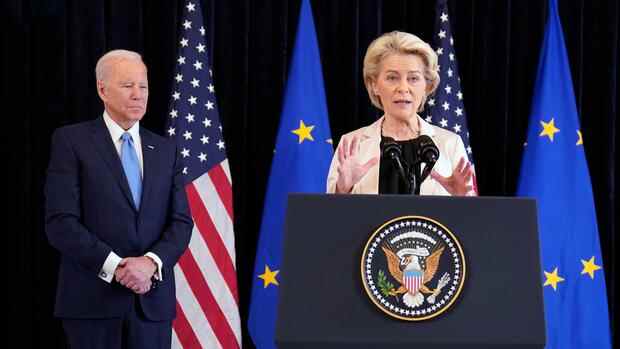During his visit to Brussels, the US President made it clear that the US is behind Europe in the Ukraine war.
(Photo: dpa)
Brussels In the end, his advisors almost had to take him away: Joe Biden, it seemed, didn’t want to leave Brussels at all. Air Force One only took off on Friday with a considerable delay to bring the US President to Poland, the second stop on his European visit.
Biden clearly felt comfortable in the circle of his closest allies. He announced a further strengthening of NATO, promised to take in Ukrainian refugees, and launched an energy pact with the EU – not a bad result for a two-day visit. And yet there was a certain melancholy about the deliberations in Brussels.
No matter how trusting the transatlantic cooperation is at the moment, the trauma of the Trump years is still having an impact. Concern about what lies ahead for Europe when the 79-year-old Biden leaves office one day, which may not be very far off, is not publicly articulated in Brussels, but can be felt everywhere.
“America is back,” Biden announced when he took office. After initial irritation, maintaining alliances is now proving to be the basic principle of his foreign policy. The wrangling over the distribution of the corona vaccines has been forgotten, the bitterness over the Taliban’s recapture of Afghanistan has receded into the background.
Top jobs of the day
Find the best jobs now and
be notified by email.
With the attack on Ukraine, Russian President Vladimir Putin brought war back to Europe. At the moment of the threat, Europeans and Americans close ranks. The transatlantic alliance is in place. The only question is: for how long?
“Biden loves Europe,” say his advisers – that makes him almost unique in top American politics. George W. Bush’s administration fell out with Europe over the Iraq war. Barack Obama, initially cheered by the Europeans, soon complained about the Allies’ free-riding and cultivated a distant, unemotional relationship with the EU. Finally, Donald Trump declared Europe an economic opponent, instigated an economic war and was on the verge of blowing up NATO.
The diplomats in Brussels are dreading Donald Trump’s return.
(Photo: dpa)
Even experienced EU diplomats shudder at the thought game of how precarious the situation in Europe would be if the US President were not called Biden but Trump. Only because the Europeans know that the Americans are on their side can they dare to counter Russian aggression with tough economic sanctions and large arms shipments. America’s military superiority deters Russia, without the US protective shield Europe would be in a bind.
Sure: There is also friction with Biden. Biden wouldn’t be Biden if he didn’t make any rhetorical missteps, communication discipline has never been his thing. The headline memorable from the Europe trip is Biden’s exclamation that Putin “must not remain in power.” The fact that the American also called the Russian president a “butcher” counteracts efforts in Berlin and Paris to persuade Putin through diplomatic channels to stop his aggression.
Basically, however, Europeans know that they can rely on Biden. The US President used his trip to pledge the West to a “struggle between democracy and autocracy, between freedom and oppression”. In this argument, the US and the EU are clearly on the same side.
>>Read here: Joe Biden has found his role: as Europe’s best man
What Europeans don’t know, however, is whether the next US administration is ready to take on the role of leading nation in the democratic world. Trump is flirting with a renewed candidacy. His chances of returning to the White House are not bad, as polls show. Isolationism has become a serious political trend in the United States.
The security situation of the Europeans has deteriorated dramatically with the Russian war of aggression against Ukraine – and it would get much worse if the Americans lost interest in acting as Europe’s protecting power. The EU must prepare for this scenario. It must become more independent militarily. Not to break away from America or to compete with NATO, but to be prepared if the US turns its back on Europe for domestic reasons.
There isn’t much time left. The next presidential election will be held in the USA in two and a half years.
More: The EU needs the “strategic compass”.
